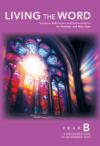Scripture Study for
Twenty-Fifth Sunday in Ordinary Time
Amos 8:4–7 / Psalm 113:1a, 7b / 1 Timothy 2:1–8 / Luke 16:1–13 [16:10–13]
<< Back to LECTIONARY RESOURCES
Understanding the Word
By Br. John R. Barker, OFM
The prophet Amos is known in particular for his sustained attack on economic injustices. Here he focuses on merchants who impatiently wait for the end of festivals—during which no trade was to occur—before getting back to their business of making money. Not only do they disdain time ordained by God to put aside such things, but when they return to them, their practices are marked by deceit and fraud. By diminishing the ephah, a dry measure, and adding to the shekel, a measure of weight, they defrauded customers by giving them less than they paid for. There were loan sharks even then, who would be willing even to take a poor person’s sandal as collateral on a desperately needed loan. God sees this, Amos says, and takes note.
It may have been that Timothy’s community felt it appropriate to pray only for fellow Christians, so that Paul feels called to emphasize that they should pray for everyone. This admonition is not only pragmatic—a small, vulnerable, and suspect religious group wants to maintain good relations with the authorities—but more importantly it is theologically motivated. There is only one God and one Mediator, desiring that all people be saved and embrace the truth that Christ came into the world to save sinners. Since all people fall within the saving will of God, whether they know it or not, Christians should gladly pray for everyone so that all may come to know this truth and be saved. This should always be done with great goodwill, and not with “anger or argument.”
The parable of the dishonest (or “unrighteous”) steward presents some difficulties of interpretation. The main question is whether the reduction the steward makes in the debts is a reduction in what was truly owed to the master (in which case the steward is once again cheating his master for his own benefit) or whether the amount removed from the debt was the extra part the steward had added for his own “take.” Both are possible, but Jesus’ comment at the end of the reading suggests it is the latter option. The steward, seeing that “the end was near,” abandoned his greedy “take” in order to ensure a good reception later on. The master commends him for this, and so does Jesus, who sees in his “prudence” a lesson about holding on to wealth. Just as the steward gave up his “dishonest mammon” to ensure a brighter future, so also should the “children of light” give up their clinging to mammon to ensure that they receive a good reception from God, to whom alone they should cling. In this way, they are “trustworthy with dishonest mammon” (by not holding on to it), and so will be considered worthy by God to receive “true wealth” in the Kingdom.
